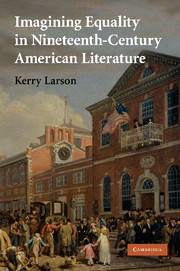Introduction
Published online by Cambridge University Press: 04 May 2010
Summary
For some time now literary criticism has been dominated by an interest in inequality – an interest that shows no signs of diminishing. Each day, it seems, we hear fresh reports on how inequality is mobilized, legitimized, rationalized, or naturalized. In the case of antebellum literature of the United States, considerations of race, gender, and class have so transformed the field that critical studies that do not in some way attempt to add to our knowledge in these areas will be expected to explain why. Indeed, questions relating to equality and inequality not only dominate the subject matter of literary criticism but increasingly inform how that criticism is evaluated. Thus it is not uncommon to find, say, a study of race commended for its discussion of the topic but faulted for slighting gender, or a study of gender praised for its insights but faulted for neglecting class. As scholars of nineteenth-century American literature judge the past, so are they judged in turn.
Imagining Equality pursues a fundamentally different approach. Instead of treating equality as a political or social good that may be won or lost, I am interested in equality as a social norm whose presence was already well established and pervasive in the antebellum era. To think of equality in these terms is of course to follow the lead of Tocqueville's Democracy in America, the sheer richness of whose insights has not yet been fully exploited by students of the period.
- Type
- Chapter
- Information
- Publisher: Cambridge University PressPrint publication year: 2008



